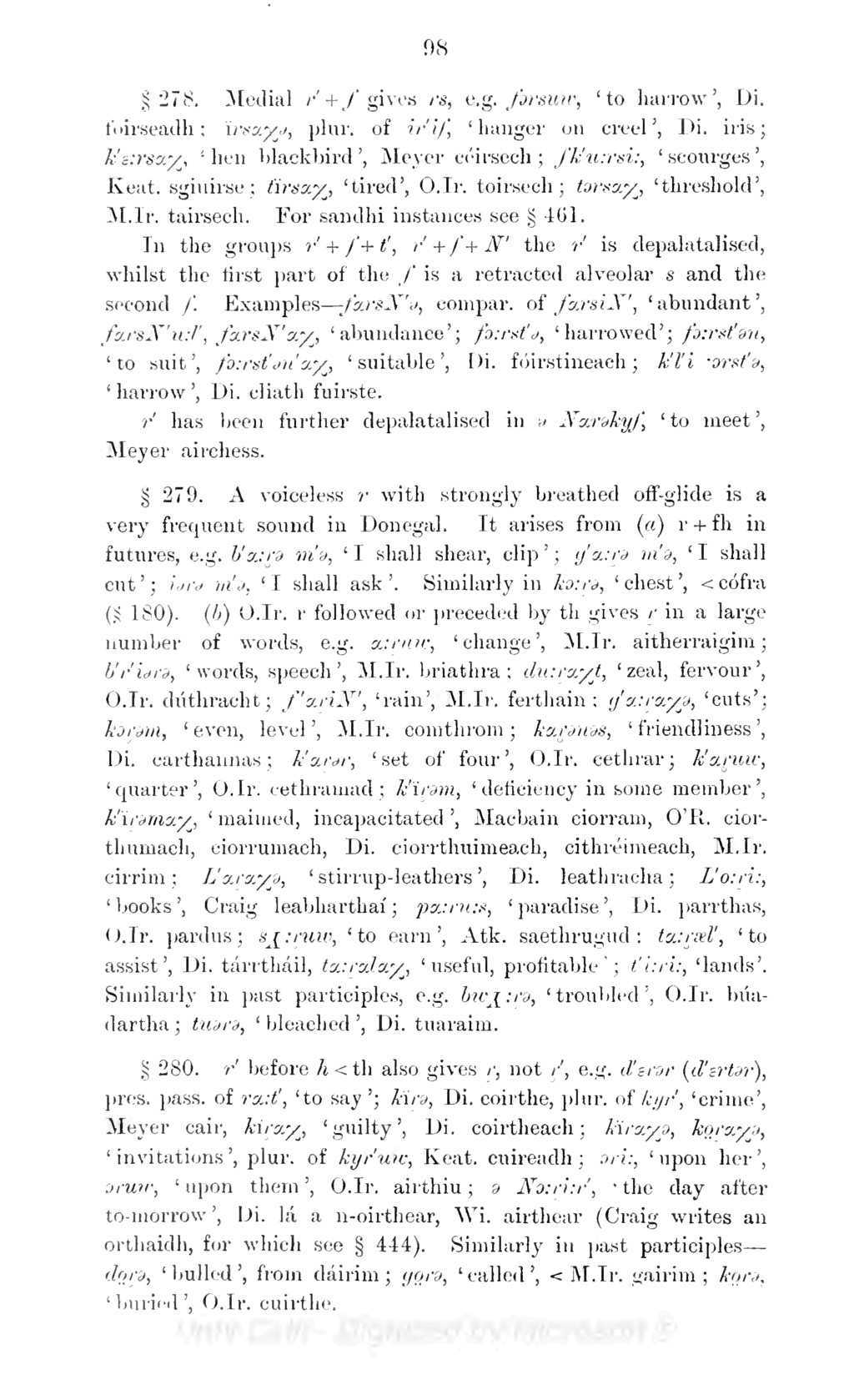§ 278. Medial rʹ+ ʃ gives rs, e.g. fɔrsuw, ‘to harrow’, Di. foirseadh; ïrsαχə, plur. of irʹiʃ, ‘hanger on creel’, Di. iris; kʹɛ꞉rsαχ, ‘hen blackbird’, Meyer céirsech; ʃkʹu꞉rsi꞉, ‘scourges’, Keat. sgiuirse; tïrsαχ, ‘tired’, O.Ir. toirsech; tɔrsαχ, ‘threshold’, M.Ir. tairsech. For sandhi instances see § 461.
In the groups rʹ + ʃ + tʹ, rʹ + ʃ + Nʹ the rʹ is depalatalised, whilst the first part of the ʃ is a retracted alveolar s and the second ʃ. Examples—fαrsNʹə, compar. of fαrsiNʹ, ‘abundant’, fαrsNʹu꞉lʹ, fαrsNʹαχ, ‘abundance’; fɔ꞉rstʹə, ‘harrowed’; fɔ꞉rstʹən, ‘to suit’, fɔ꞉rstʹənʹαχ, ‘suitable’, Di. fóirstineach; kʹlʹi ·ɔrstʹə, ‘harrow’, Di. cliath fuirste.
rʹ has been further depalatalised in ə Nαrəkyʃ, ‘to meet’, Meyer airchess.
§ 279. A voiceless r with strongly breathed off-glide is a very frequent sound in Donegal. It arises from (a) r + fh in futures, e.g. bʹα꞉r̥ə mʹə, ‘I shall shear, clip’; gʹα꞉r̥ə mʹə, ‘I shall cut’; iər̥ə mʹə, ‘I shall ask’. Similarly in kɔ꞉r̥ə, ‘chest’, < cófra (§ 180). (b) O.Ir. r followed or preceded by th gives r̥ in a large number of words, e.g. α꞉r̥uw, ‘change’, M.Ir. aitherraigim; bʹrʹiər̥ə, ‘words, speech’, M.Ir. briathra; du꞉r̥αχt, ‘zeal, fervour’, O.Ir. dúthracht; fʹαr̥iNʹ, ‘rain’, M.Ir. ferthain; gʹα꞉r̥αχə, ‘cuts’; kɔr̥əm, ‘even, level’, M.Ir. comthrom; kαr̥ənəs, ‘friendliness’, Di. carthannas; kʹαr̥ər, ‘set of four’, O.Ir. cethrar; kʹαr̥uw, ‘quarter’, O.Ir. cethramad; kʹïr̥əm, ‘deficiency in some member’, kʹïr̥əmαχ, ‘maimed, incapacitated’, Macbain ciorram, O’R. ciorthumach, ciorrumach, Di. ciorrthuimeach, cithréimeach, M.Ir. cirrim; Lʹαr̥αχə, ‘stirrup-leathers’, Di. leathracha; Lʹo꞉r̥i꞉, ‘books”, Craig leabharthaí; pα꞉r̥u꞉s, ‘paradise’, Di. parrthas, O.Ir. pardus; s⅄꞉r̥uw, ‘to earn’, Atk. saethrugud; tα꞉r̥ælʹ, ‘to assist’, Di. tárrtháil, tα꞉r̥αlαχ, ‘useful, profitable’; tʹi꞉r̥i꞉, ‘lands’. Similarly in past participles, e.g. bw⅄꞉r̥ə, ‘troubled’, O.Ir. búadartha; tuər̥ə, ‘bleached’, Di. tuaraim.
§ 280. rʹ before h < th also gives r̥, not r̥ʹ, e.g. dʹɛr̥ər (dʹɛrtər), pres. pass. of rα꞉tʹ, ‘to say’; kïr̥ə, Di. coirthe, plur. of kyrʹ, ‘crime’, Meyer cair, kïr̥αχ, ‘guilty’, Di. coirtheach; kïr̥αχə, ko̤r̥αχə, ‘invitations’, plur. of kyrʹuw, Keat. cuireadh; ɔr̥i꞉, ‘upon her’, ɔr̥uw, ‘upon them’, O.Ir. airthiu; ə Nɔ꞉r̥i꞉r, ‘the day after to-morrow’, Di. lá a n‑oirthear, Wi. airthear (Craig writes an orthaidh, for which see § 444). Similarly in past participles—do̤r̥ə, ‘bulled’, from dáirim; go̤r̥ə, ‘called’, < M.Ir. gairim; ko̤r̥ə, ‘buried’, O.Ir. cuirthe.
